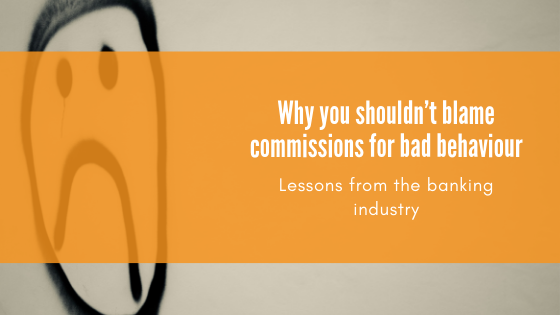Why you shouldn’t blame commissions for bad behaviour

If I had a dollar for every time I have heard people blame commissions for bad sales practices, well, I’d be living in the south of France right now. I have worked as a sales professional for most of my adult life and I can tell you one truth as a salesperson, sales manager, and business owner: the salespeople who focus on commissions never win.
Yes, they make sales, in the short term. But in the long term, they get caught out.
They get caught with their hand in the cookie jar because they don’t show enough care for their clients and the businesses they are working with. This style of sales is slowly dying out. Why? Because it doesn’t work.
In our connected world, customers and clients are so educated. They can find information quickly and easily and they talk online about their experiences. But more than that, we are more attuned to being conned or getting half-truths from people. Whether it is politicians, hairdressers or salespeople, our truth-o-meter is finely tuned.
The truth is, more than ever, we are all craving truth and honesty in business and in life. I know we have all met salespeople that follow old-school manipulation, but the truth is, this just hasn’t ever been great selling. It’s lazy selling, focusing on what the salesperson wants and not on the client. Great selling is helping people make a great buying decision — for them.
The real problem
The real problem is short-term and self-focused thinking. Whether it is in big or small businesses, governments or institutions, these shortcomings are evident.
We smell them a mile off. And they have really been brought to light and exposed with both the royal commission into banking and the royal commission into child abuse. The problem is short-term, internally biased thinking.
Those in leadership roles in these businesses and institutions are too far removed from what their customers really want and what they really think. Worse than that, they don’t care.
What I mean is they haven’t taken the time and effort to deeply understand what people want. Now you can blame the employees on the front line, or the middle management, but the truth is, the short-term goals of the top executives, of those in charge, are paramount, and these are what we see playing out at the lower levels in the organisation.
If they wanted to, they could put in place practices that focused on long-term relationships with their customers. They could prioritise deep insights and information that would help them steer their organisation via feedback loops and continuous improvement. But they don’t. They have chosen not to and now those choices are coming home to roost.
The truth is the people on the front line in the banking industry, and many other businesses, are on a short-term KPI merry-go-round. Where the KPI’s are set each year, the new target, the new theme, and each September or October, people are cut from positions if they don’t meet these targets. So, when we review the employees and what they are doing, we can see as this pattern repeats each year, these people weren’t chasing commissions, they were acting to survive, to keep their jobs.
But it goes deeper than this.
The banks make short-term assumptions about their customers too. They assume customers will move every three years. So, they set up incentives that mirror their three-year expectation. To look after you for that period and then everything gets harder. It becomes more difficult to get loans. More difficult to get a better rate. Because you are now a statistical anomaly. You are a customer that defies their three-year model.
Let’s build a new model
Here’s an idea. What if instead of writing off the anomalies, we embraced them?
What if we took the time and effort to get to know why these customers stay and how we could make their lives easier?
What if through these insights we could understand and foster more long-term customers?
What difference would that make to a bottom line?
I tell you if we could get businesses, all businesses, to foster their existing clients and improve their lives, they would need to rely less on new leads and the ongoing churn from dissatisfied customers.
The banks are no different from other businesses, where they are wedded to getting new customers in the front door and focus almost exclusively on that. Meanwhile, they leave the back door open and unattended as customers leave.
It is foolish to overlook the great untapped resource of existing clients. It makes great business sense to keep existing clients. It’s cheaper and easier for staff. These clients already know how your systems work, and more than that, they can help you grow through referrals and improving your brand name in the marketplace.
Our short-term focus feeds the lead-generation goliath that has gotten too big.
Our short-term thinking has ignored our best asset: our customers.
Our short-term thinking has divorced us from why we started our business in the first place: to help our clients.
Now is the time to pick up the phone, buy your existing clients a coffee, and spend some time re-establishing and setting a rhythm for an ongoing relationship with them.
Originally published 3rd May 2019 - Smart Company
Photo by Jan Prokes from Pexels

 0417 331 040
0417 331 040